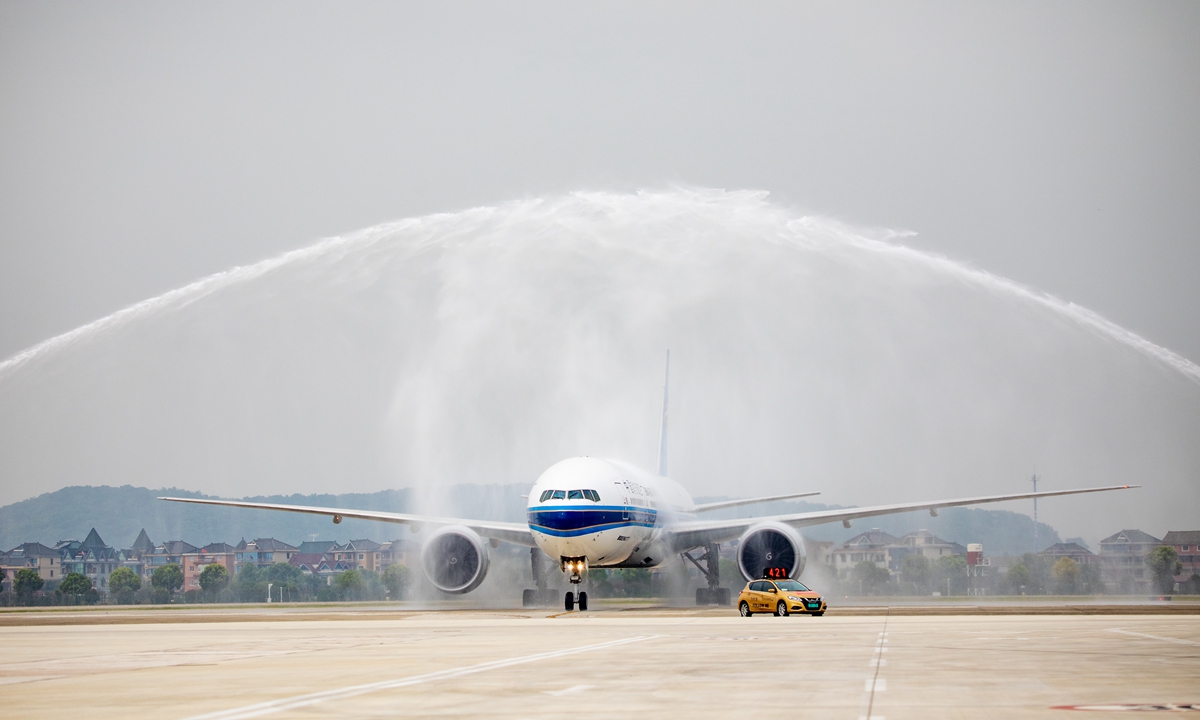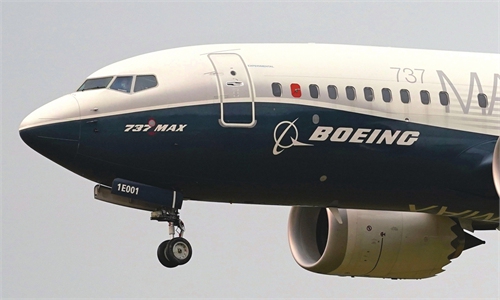Boeing says China’s commercial fleet will double by 2041, to be fueled by robust demand

A flight is welcomed with a watergate ceremony at the Hangzhou Xiaoshan International Airport in Hangzhou, East China's Zhejiang Province on September 22, 2022. It's the first inbound flight to use phase III of the airport, which will serve the Asian Games Hangzhou 2022. Photo: VCG
A Boeing forecast released on Thursday said that China's commercial fleet will more than double in next 20 years, fueled by strong passenger and cargo demand.
Despite the impact of the pandemic on China's near-term growth, Boeing predicts that demand for air travel and freight will continue to go upwards through to 2041, with the country's commercial fleet growing from around 3,900 airplanes to more than 9,600 by early 2040s.
China will require 8,485 new aircraft valued at $1.5 trillion to serve commercial travel and trade. The figure represents more than a fifth of the global airplane deliveries over the next two decades, according to the 2022 Commercial Market Outlook.
Notably, there will be continued growth in the freighter market, with China's freighter fleet more than quadrupling in size to more than 800 airplanes by 2041.
"We have full confidence that China's commercial aviation market will continue to prosper, despite recent economic headwinds", said Peter Gao, Boeing vice president for Commercial Sales and Marketing in China. "China's economic fundamentals will continue to fuel significant demand for both its passenger and cargo fleets."
The report also said commercial passenger traffic in China will grow by 4.9 percent annually, with 1,570 wide-body airplanes and 6,370 single-aisle airplanes needed to support a growing network of international and domestic routes.
In addition, the freighter segment will see 205 deliveries to meet the requirements of continued e-commerce growth, and a strong industrial supply chain.
To meet the needs of e-commerce companies for cross-border delivery services, major firms will continue to enhance e-commerce offerings by adding a wide range of delivery solutions.
FedEx Express, a subsidiary of FedEx Corp, told the Global Times earlier that they are strengthening networks in China, aiming to connect the market more closely with the world by expanding flights.
It said in July that it signed an agreement with the Guangdong Airport Authority Logistic Company to expand and upgrade the FedEx Guangzhou Gateway by establishing a new FedEx South China Operations Center in Guangzhou.
China's first cargo airport in Ezhou, Central China's Hubei Province, welcomed its maiden test flight in March. The airport, the country's first cargo airport back by an investment of 32 billion yuan ($5.03 billion), will be able to handle 3.3 million tons of cargo and 1.5 million passenger trips by 2030.
Data from the Civil Aviation Administration of China on Wednesday showed that the cargo turnover in the third quarter hit 1.56 million tons, recovering to 80.6 percent of 2019 levels.
In September, Boeing and AerCap announced the milestone delivery of the 100th contracted 737-800 Boeing Converted Freighter (BCF) to the world's largest lessor, AerCap. In 2016, AerCap Cargo was the launch customer for Boeing's 737-800BCF program. Today, AerCap Cargo has the largest fleet of 737-800BCFs with 65 firm orders and nine options.
Global Times


